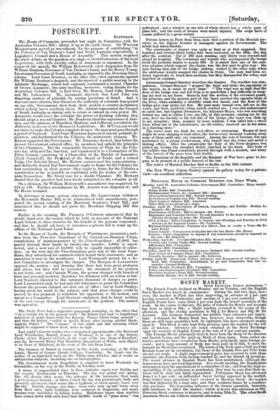Private letters in Paris from Oran state that a portion
of the Moorish ter- ritory on the Algiers frontier is insurgent against its Government. The rebels had taken Ouchda.
The catastrophe at Angers was quite as fatal as at first supposed. One hundred and twenty-three bodies had been recovered on the 16th, the day after the accident. Out of 282 men missing, only thirty were rescued and placed in hospital. The townsmen and women who accompanied the troops swell the probable deaths to nearly 300. It is stated that one of the east- iron columns which support the chains was the first part to give way : the men feeling that side of the bridge sinking, rushed to the other aide, when the additional weight snapped the chains in twain. The men had been or- dered repeatedly to break into sections, but they disregarded the order, -and marched in columns.
LieutenantColonel Sisnonet describes the disaster. The weather was tem- pestuous. Colonel Simonet "stopped the band and broke the regularity of the march, as is usual in such cases." "The wind was so high that the floor of the bridge rose and fell from it so much that I had difficulty in keep- ing my seat on my horse. Scarcely had the section of the advanced guard, the pioneers, and the greater part of the band reached the opposite bank of the river, when suddenly a horrible crash was heard, and the floor of the bridge gave way imder our feet. My poor mare tunied over, left me in the water, and then, suddenly riming, nearly crushed me. I rose and endeavoured to catch her, but Captain Dermiarest, my Adjutant-Major, who was marching behind me, and to whom I owe my life, at this moment, seizing me by the arm, drew me forcibly to the left side of the bridge (the water was then up to my armpits) ; then, assisted by some soldiers, I was lifted into a small boat, when one of the inhabitants, an old soldier, received me in his arms, in a fainting state." The waves were too high for cool effort, or swimming. Masses of men might be seen clinging to each other, the waves every moment washing away some of them until only one remained. Among the acts of heroism was one performed by a young workwoman, who leaped into the water and saved a sinking officer. After the catastrophe the body of the Porte-drapeau was picked up, having the standard firmly clutched in his hand. The body of one soldier was -found completely pierced through with a musket, and many of the barrels of the guns were bent double.
The President of the Republic and the Minister of War have gone to An- gers, to be present at a public funeral of the lost.
The widow of Marshal Blucher died at Berlin =the 16th instant.


























 Previous page
Previous page